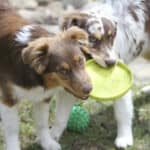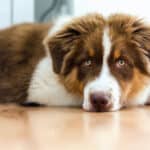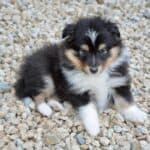Are you thinking about getting an Australian Shepherd? These dogs are so cool – they’re smart, energetic, and super loyal. But if you have allergies, you might be wondering if Aussies are right for you. So, are Australian Shepherds hypoallergenic?
Well, the short answer is no.
All dogs can cause allergies in some people because they shed fur and make dander, which are just tiny bits of skin. Some breeds make less dander and shed less fur, so they’re called hypoallergenic. But no breed is completely allergy-free.
Why do Australian Shepherds shed and produce dander?
Dogs, just like people, have skin and fur to keep them warm and protected.
See, Dogs have a particular layer of skin called the dermis that produces dandruff. Dander falls off into the air when a dog’s skin brushes against their fur. Because Aussies have long and thick fur, they shed more than other breeds.
Did you know that Australian Shepherds are sometimes called “Velcro dogs” because they love sticking to their humans so much? They’ll follow you around all day if you let them!
But don’t worry – there are ways to help reduce the amount of dander and shedding that your Aussie makes. You can groom and brush your dog regularly to remove loose fur and dander from their coat. You can also take your dog to a professional groomer for a thorough grooming session. And if you feed your dog high-quality dog food that’s full of good stuff, it can help keep their coat healthy and reduce shedding.
If you suffer from allergies…
You might want to think of getting a short-haired Australian Shepherd if you struggle from allergies. Compared to long-haired Aussies, they have a shorter, smoother coat that is simpler to maintain and sheds less. Although they may still shed a bit, they are a better option for allergy sufferers.
A less-sheddy breed, such as a Border Collie or an Australian Cattle Dog, is an additional choice. These two breeds both have short, sleek coats that are simple to maintain and shed less than Aussies. They are fantastic for training and work-related activities since they are also extremely intelligent and love to work.
Did you know THIS about Aussies?
Also, did you know that an Aussie can be crossed with another breed, such as a Poodle or a Schnauzer? Aussie Schnauzer and Aussiedoodle are the names of these hybrid breeds. Because to the reputation of Poodles for having hypoallergenic coats and minimal shedding, the Aussiedoodle may be a little more hypoallergenic. Although no dog is totally hypoallergenic, keep that in mind. Before committing, it’s usually a good idea to spend some time with any breed you’re considering adopting to determine whether you have any allergies.
The following dog breeds are regarded as hypoallergenic:
Poodles: Due to their hypoallergenic coat and little shedding, poodles are a favorite breed among those who suffer from allergies. You may select one that is ideal for your lifestyle because they are available in various sizes. Poodles are also lively, clever, and simple to train.
Bichon Frise: The Bichon Frise is a little, fluffy breed with a low-shed, hypoallergenic coat. They get along well with children and are amiable and kind. The lively natures and desire of attention that Bichon Frises are known for.
Maltese: The petite, fluffy breed of Maltese has a hypoallergenic coat that sheds less. They are kind, loving, and wonderful with children. Additionally clever and simple to train, Maltese.
Schnauzer: The Schnauzer is a medium-sized breed with a low-shedding, hypoallergenic coat. They are capable, enthusiastic, and simple to train. Schnauzers are wonderful watchdogs and are extremely devoted to their families.
Lhasa Apso: The Lhasa Apso is a little, fluffy breed with a low-shed, hypoallergenic coat. They are warm, kind, and wonderful with children. Additionally clever and simple to teach, Lhasa Apsos.
Afghan Hound: The Afghan Hound is a big, classy breed with a hypoallergenic, low-shedding coat. They are self-reliant, active, and good with children. Additionally, clever and simple to train are Afghan Hounds.
Other commonly asked questions that we get:
What are hypoallergenic dogs?
Hypoallergenic dogs are breeds that produce less dander and shed less fur than other breeds, making them less likely to trigger allergies in people.
Are all hypoallergenic dogs completely allergy-free?
No, no breed of dog is completely allergy-free. However, hypoallergenic dogs are generally considered to be less likely to trigger allergies in people.
What are some examples of hypoallergenic breeds?
Some examples of hypoallergenic breeds include Poodles, Bichon Frise, Maltese, Shih Tzu, Schnauzer, Lhasa Apso, Afghan Hound, Miniature Poodle, Standard Poodle, and Toy Poodle.
Is it true that hypoallergenic dogs don’t shed at all?
No, it’s not true that hypoallergenic dogs don’t shed at all. While they do shed less than other breeds, all dogs shed to some extent.
Can I still get an allergic reaction from a hypoallergenic dog?
It’s possible to still have an allergic reaction to a hypoallergenic dog, although it’s less likely than with other breeds. If you’re considering getting a hypoallergenic dog and have allergies, it’s a good idea to spend some time with the breed you’re considering adopting to see if you have any reactions.

Conclusion
So, there you have it! Australian Shepherds aren’t hypoallergenic, but there are ways to reduce the amount of dander and shedding they produce. If you have allergies, you might want to consider getting a short-haired Aussie or a breed that doesn’t shed as much. And if you don’t have allergies, you can still have a happy and healthy Aussie by grooming and feeding them well.
Just remember to keep some tissues handy for those sneezes!
——-
Article Sources:
“Hypoallergenic Dogs: A Guide to Non-Shedding Breeds” – This article from the American Kennel Club provides a detailed list of hypoallergenic dog breeds and information on why some breeds are considered hypoallergenic.
“All About Hypoallergenic Dogs” – This article from the American College of Allergy, Asthma, and Immunology provides information on hypoallergenic dogs and how to manage allergies when living with a dog.
“Hypoallergenic Dogs: What You Need to Know” – This article from the Humane Society provides information on hypoallergenic dogs, including how to choose a hypoallergenic breed and how to manage allergies when living with a dog.
“Hypoallergenic Dogs: The Low-Allergen Pup” – This article from the Mayo Clinic provides information on hypoallergenic dogs, including which breeds are considered hypoallergenic and how to manage allergies when living with a dog.



